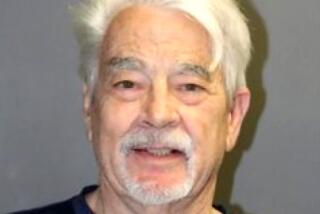Patient of Suspended Doctor Recalls Addiction
- Share via
Sherry Heuel was up to 20 painkillers a day when she realized she wasn’t getting any better.
In fact, the Camarillo mother of three felt much worse than she had on the day 18 months earlier when she walked into Dr. Michael Huff’s office suffering from migraines and poor sleep.
But she couldn’t bring herself to stop popping Lortab, an opiate similar to Vicodin. When she tried, she vomited and ached all over and had an unbearable craving for the drug, the 36-year-old teacher’s aide recalled.
One week after completing an intensive detoxification treatment, Heuel said she is feeling great and has her “head back.”
With the change comes the realization that she was an accidental addict -- one of dozens who state health investigators say were led astray by Huff, their trusted physician.
“I have the white picket fence and the yellow Lab that chews the couch,” Heuel said recently from the suburban home she shares with her husband, Fred, and sons. “I’ve got the perfect life. But it happened to me.”
Huff’s Oxnard practice was shut down by the state last month after prosecutors alleged the doctor was so zealous with his prescription pad that he was turning patients into junkies.
Huff declined to comment. But at an April 10 hearing at which the doctor appealed the suspension of his medical license, he said he had rendered appropriate care and denied that he poses a danger to the community. He has suggested he is being targeted for punishment because the medical community looks suspiciously upon those who treat chronic pain aggressively.
In pushing for a suspension of Huff’s license, the Medical Board of California cited four patients for whom Huff prescribed massive doses of narcotics for lower-back pain and other relatively minor health complaints. All of them eventually ended up in drug rehabilitation and one nearly lost her liver, court documents state.
Experts who reviewed 33 files seized from Huff’s office found that in 22 cases, the doctor did not follow standard procedure for treating pain. Instead of starting with nonaddictive analgesics, Huff’s pattern was to prescribe narcotics right away and then up the dose as the patient developed a tolerance, according to Dr. Hugh Washburn, a consultant for the Medical Board of California.
A separate criminal investigation by the Ventura County Sheriff’s Department is probing whether Huff contributed to the drug-related deaths of at least three of his patients, and whether some drugs prescribed by the doctor made their way onto the street. No charges have been filed.
Attorney James Farley, who represents Huff in the criminal inquiry, said recently that the actions underscore the medical profession’s lack of sophistication about pain-management therapy.
“The traditional medical community has no understanding of the use of the narcotics, and therefore he’s being condemned,” Farley said. “There’s a very strong prejudice against those engaged in the practice.”
Huff began drawing the attention of authorities when he informally took on a chronic-pain management specialty several years ago.
While many of his patients were legitimate pain sufferers, investigators believe that Huff’s reputation as having a loose prescription pad began drawing addicts or drug dealers.
Some were referred to Huff by their insurance carrier, never knowing of his reputation. Sherry Heuel fell into that category.
A few months after giving birth to twin boys, she started having piercing headaches, Heuel said. The strain of working and caring for her growing family on little sleep also took a toll, leading her to seek medical help.
On her first visit, Huff diagnosed postpartum depression and prescribed an antidepressant, Heuel said. He also prescribed Lortab for her headaches.
The antidepressant just made her sleepy. But the Lortab not only took away her migraines, it made her feel “like a superwoman,” Heuel said.
“Just one a day was fine at first. Then I went up to two,” she said. “Then Dr. Huff upped my dosage.”
Heuel thought that because her doctor was giving her the drugs, it must be fine. But a year later, she knew she had a problem when she decided to stop taking them.
She got so sick that she couldn’t function. She struggled with how to tell her husband she had become addicted.
Fred Heuel, the night manager at a Thousand Oaks grocery store, noticed that his wife had become distant.
He assumed it was the stress of juggling family, work and school. By then, Sherry was also attending classes at Cal State Northridge to get a teaching credential.
Heuel told Huff she was worried that she was becoming dependent on Lortab. In response, Huff offered to prescribe Roxycodone, an even stronger narcotic, Heuel said.
She turned him down. Instead, disillusioned and near despair, she took matters into her own hands, researching detox programs on the Internet.
She settled on the Waismann Institute in Beverly Hills. Waismann uses a popular “rapid detox” approach that promises to make opiate users clean and sober in 48 hours.
While under anesthesia, Heuel two weeks ago was given the drug Naltrexone, which rapidly cleans the system of opiates and breaks cravings.
After just two days in a clinic at Tustin Hospital, Heuel was home again.
Even with her trials kicking the drug, Heuel is sympathetic toward her former doctor. He didn’t rush through patients, she recalled, and seemed genuinely interested in her health.
“I really don’t think he did this to be malicious,” she said. “But he had that prescription pad and felt like he knew more than other doctors. He is dangerous to the community and doesn’t even know he is.”
More to Read
Sign up for Essential California
The most important California stories and recommendations in your inbox every morning.
You may occasionally receive promotional content from the Los Angeles Times.














